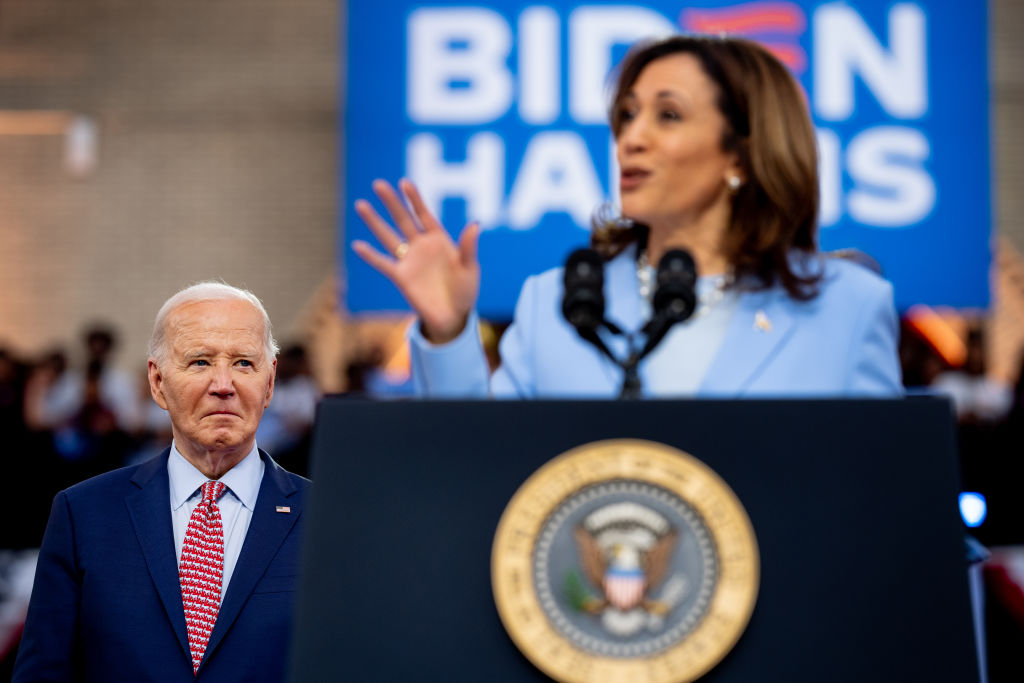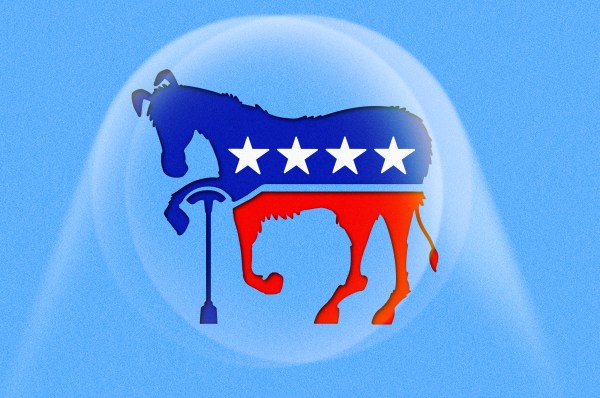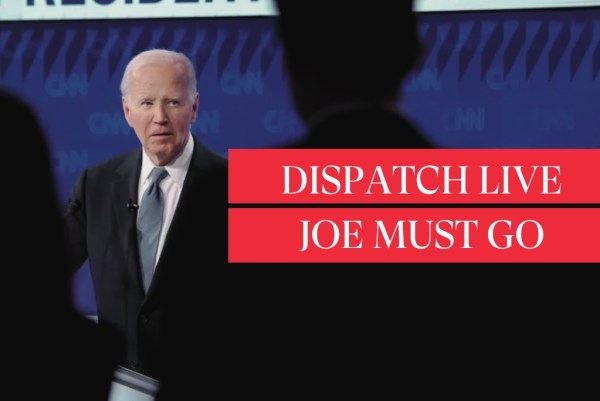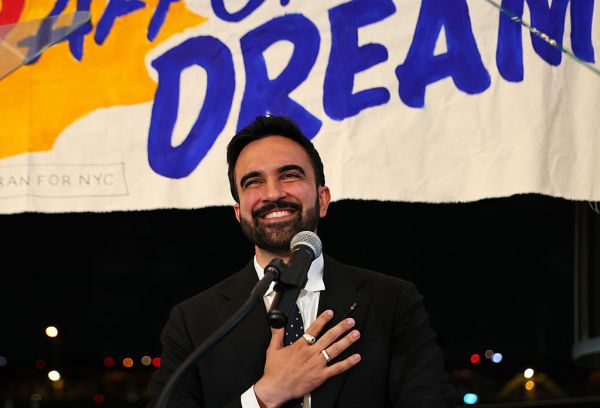Happy Wednesday! Assuming no massive political news breaks over the holiday—yes, we’re thinking the same thing you are—expect to see us back in your inboxes on Monday! Eat some hot dogs, watch some fireworks, and enjoy celebrating this great country of ours. 🇺🇸 🦅 🇺🇸
Quick Hits: Today’s Top Stories
- Hurricane Beryl—currently a Category 4 storm—killed at least six people in the southern Caribbean on Tuesday, and is poised to reach the island nation of Jamaica on Wednesday. The storm—which escalated from a tropical storm to the highest category hurricane in a matter of days, before making landfall as a Category 4 storm—has sustained winds of up to 155 miles per hour, causing significant damage to the buildings and infrastructure of the southern Caribbean islands and northern Venezuela. Beryl is expected to reach Mexico’s Yucatán Peninsula later this week.
- A stampede at a Hindu religious gathering in northern India on Wednesday reportedly killed more than 100 people—including women and children—and injured dozens more. Thousands of people had gathered in the small city of Hathras, India, for a prayer meeting organized by a Hindu preacher before intense heat and overcrowding seemed to cause the stampede, local authorities said. “The loss of life in the unfortunate accident in Hathras district is extremely sad and heart-wrenching,” said Yogi Adityanath, chief minister of the Indian state where the incident occurred. “A team has been formed … to investigate the causes of the accident.”
- The Supreme Court declined on Tuesday to hear several Second Amendment cases after it was asked to consider whether the federal government can prevent people with felony convictions from purchasing firearms and whether an Illinois law banning the purchase of high-powered firearms and high-capacity magazines is constitutional. While the court has turned down these cases—at least in part based on their ruling last month in United States v. Rahimi, which upheld a federal law that bars people under domestic violence restraining orders from owning guns—they will hear a gun-related case next term centered on whether the Biden administration can regulate so-called “ghost guns.”
- Judge Juan Merchan, who oversaw former President Donald Trump’s New York criminal trial in May, on Tuesday delayed the former president’s sentencing from July 11 to September 18. Though Merchan didn’t articulate a specific reason for the delay, the change follows reports that Trump’s legal team was looking to challenge the former president’s conviction on all 34 felony counts after the Supreme Court ruled presidents have some immunity from prosecution for official acts, likely arguing that some of the evidence presented in that trial should have been considered privileged.
- Rudy Giuliani, the former New York City mayor and longtime Trump adviser, was disbarred in his home state of New York on Tuesday for making “demonstrably false and misleading statements” about the results of the 2020 presidential election, according to a ruling from New York’s Appellate Division First Department. Giuliani previously had his law license suspended in the state in 2021 but is now prohibited from offering legal counsel in any capacity as a lawyer, attorney, or counselor-at-law. The former mayor asked a bankruptcy court on Monday to liquidate his assets, six months after he filed for bankruptcy following a jury ordering Giuliani to pay two Georgia election workers $148 million in damages after he was found liable for defaming them.
- The Food and Drug Administration on Tuesday approved a drug—donanemab, sold under the name Kisunla and produced by Eli Lilly—that could slightly slow cognitive decline for those in the early stages of Alzheimer’s disease and dementia. The FDA had extended its investigation into the product in March amid safety concerns—like the risk of brain swelling—but its approval of donanemab appeared imminent last month when an independent FDA advisory committee endorsed the drug’s effectiveness at slowing down cognitive decline.
- Virginia election officials on Tuesday certified Republican Rep. Bob Good’s primary loss to state Sen. John McGuire—a former Navy SEAL endorsed by former President Donald Trump—in last month’s GOP primary, which came down to about 400 votes. Good, the chair of the House Freedom Caucus who endorsed Ron DeSantis for president last year, immediately requested a recount, as is allowed by Virginia law. However, the margin is sufficient that Good will have to finance the count himself. Good has also floated legal challenges to the vote after alleging that election officials in Lynchburg, Virginia, “did not secure their drop boxes.”
Not Just One Bad Night

When President Joe Biden went before cameras on Monday night to address the Supreme Court’s ruling on presidential immunity, he looked well made up—a far cry from the pale, gaunt figure he cut on Thursday night during the first general election debate. He read four minutes of prepared remarks from a teleprompter, more-or-less without incident, and took no questions from reporters.
Biden has for years avoided the kind of unbridled panic now spreading within the Democratic Party about his age and mental acuity by doing exactly that kind of appearance: Short, teleprompter-ed, and with no questions from the press. But after Thursday’s debate—when he was pitiably confused, inarticulate, and, in general, showing clear signs of cognitive decline—those short appearances seem like perhaps the best Biden is now capable of.
Over the last several days, that reality has seemed to become unacceptable even to those who’d long been willing to tell the American people there was nothing to see here. Though only Biden himself is capable of making the call that it’s time for him to step aside in favor of another candidate—potentially Vice President Kamala Harris—the dam seems increasingly ready to break as more and more Democrats express concern about Biden’s condition and electoral prospects come November.
As we detailed on Friday, practically no one—not even the most partisan Democrats—could hide their shock at Biden’s performance on Thursday. But following a largely gaffe-free appearance by Biden in a scripted rally speech in North Carolina and comments from Barack Obama and Bill Clinton on Friday urging caution, many of those partisans recovered as the weekend wore on. By the time the Sunday shows rolled around, they had put on their game faces. “Let us not make a judgment on a presidency on one debate,” former House Speaker Nancy Pelosi said on CNN’s State of the Union.
“The race has not fundamentally changed,” Kate Bedingfield, former communications director for the Biden White House, added Sunday. “I think there’s universal agreement [it] wasn’t a great night for Joe Biden. He said as much. But what we see in all the data that has emerged since Thursday is the fundamental head-to-head hasn’t shifted. … Every campaign recovers from one bad night.” The assessment marked a noticeable change from Bedingfield’s initial reaction Thursday evening, when she said the president had failed to convince voters he had the stamina to do the job.
Likewise, close Biden ally and campaign co-chair Sen. Chris Coons of Delaware doubled down on the idea that the debate was a fluke. “Everybody has a bad night,” he told CNN’s Jake Tapper, who moderated Thursday’s debate, on Monday. Coons added that he was urging the president to do “unscripted, casual” engagements with the press and the public, “so that you can see what I’ve seen with our president in the last few months and, of course, the last few years.”
The campaign itself has downplayed public concern at every turn. The Biden campaign’s digital director, Rob Flaherty, seemed to mock those worried about Biden’s condition as the “bedwetting brigade” in a fundraising email over the weekend. And in a call with some 500 Democratic donors on Monday, Biden campaign chairwoman Jen O’Malley Dillon was reportedly blasé about Biden’s health struggles. “He’s probably in better health than most of us,” Dillon told donors.
Americans, however, don’t seem to buy that it was just “one bad night.” In fact, a CBS News poll in the field after the debate and released Sunday showed that 72 percent of respondents thought Biden did not have the “mental and cognitive health to do the job.” Early last month, that number was 65 percent.
The Biden camp was hoping the early debate would remind Trump-averse voters that former President Donald Trump is going to be the nominee to make the election a choice between Trump and Biden, rather than a referendum on the current president.
So much for that.
At best, the most recent polls—including a CNN survey done after the debate—show Biden trailing Trump as much as he ever has. And at worst, Puck reported yesterday that internal Democratic polling has Biden sinking preciptiously in several key battleground states that once seemed winnable for the president.
And the polls aren’t just bad for Biden in battleground states: Biden trailed Trump in New Hampshire in the latest St. Anselm College poll in the field after the debate. In December, the president led his opponent there by 10 points. In 2020, Biden won New Hampshire by some 7 points.
There are theoretically several ways the Biden campaign and administration might reassure voters—and the world—that the president is still up to the task. One seemingly obvious step would be to hold a press conference during which Biden could demonstrate he was still able to field questions from journalists and speak extemporaneously on a variety of issues. “I cannot believe five days later he still hasn’t done an interview or held a press conference,” Brendan Buck, a Republican strategist and former staffer to House Speakers Paul Ryan and John Boehner, said Tuesday. “Literally any other politician in America would have been out already to clean it up. Only one explanation for it.”
Biden does plan to go on a mini press blitz—eventually. ABC News announced Tuesday that the president would tape a sit-down interview with George Stephanopolous on Friday—more than a week after the debate—that will air on Sunday. White House press secretary Karine Jean-Pierre said Tuesday that the president plans to hold a full press conference next week during the NATO summit in Washington.
Another avenue to reassure the public would be a clean medical and cognitive test. One such exam is the Montreal Cognitive Assessment or MoCA test, which assesses memory, visuospatial skills, language and naming ability, and other cognitive skills, Dr. Elisheva Coleman, a neurologist at the University of Chicago, told TMD. Coleman stressed that she hasn’t personally evaluated Biden and that any diagnosis via television would be irresponsible, but outlined how such a diagnosis would typically be made. “If you don’t ace the MoCA, it’d be conclusive that you can’t do those duties,” she said. “If he got a good score, I don’t know that it would allay all my concerns, but it’d make me pause a bit.”
Even Pelosi, softening Sunday’s strident defense of Biden, backed a cognitive test in an interview with MSNBC on Tuesday as the tide began to turn among Democrats. “I think it’s a legitimate question to say, ‘Is this an episode, or is this a condition?’” she said. “And so when people ask that question, it’s completely legitimate—of both candidates.”
“Both candidates owe whatever test you want to put them to, in terms of their mental acuity and their health,” she added, referring to Biden and Trump. “Both of them.”
Asked on Tuesday whether Biden had undergone a neurological scan after the debate, Jean-Pierre obfuscated. “A neurological scan?” she repeated, seeming gobsmacked. “Look, um, what I can say is that—just to take a step back: It was a bad night. We understand that it was a bad night. Um, and the president has spoken to this and he understands that. And so I cannot speak to anything beyond what I just shared.”
Indeed, reporting this week seems to have confirmed that Biden is showing consistent—and worsening—signs of cognitive decline behind closed doors. The New York Times reported Tuesday that people who’ve been in the room with Biden for interviews recently say his lapses are becoming more frequent, and seem more likely when he’s particularly tired or in a crowd. During debate prep last week—which lasted six days and never got going before 11 a.m.—the president was given time each afternoon to take a nap. In a similar vein, Alex Thompson at Axios reported over the weekend that Biden is “dependably engaged” between 10 a.m. and 4 p.m., but is more likely to have bad moments outside those times or while traveling abroad.
“His cognitive impairment is very apparent to people without medical training—and there is likely a medical explanation for it,” Coleman told TMD. “People are seeing what they’re seeing.”
Congressional Democrats and Democratic hopefuls are starting to get spooked—likely worried about the presidential race but also a potential down-ballot drag if Biden stays in through November. Democratic Rep. Lloyd Doggett of Texas broke the seal on Tuesday, becoming the first sitting elected Democrat to call for Biden to step aside. “I represent the heart of a congressional district once represented by Lyndon Johnson,” he wrote in a statement. “Under very different circumstances, he made the painful decision to withdraw. President Biden should do the same.”
Likewise, Adam Frisch, a Democratic candidate for Colorado’s competitive 3rd Congressional District, said it was time for Biden to go. “We deserve better,” he said in a video. “President Biden should withdraw from this race. I thank President Biden for his years of service, but the path ahead requires a new generation of leadership to take our country forward.”
Some vulnerable Democrats are taking another approach: acceptance. On Tuesday, Rep. Jared Golden of Maine argued in an op-ed in the Bangor Daily News that Trump is clearly going to win—and actually, it’s fine. “Democrats’ post-debate hand-wringing is based on the idea that a Trump victory is not just a political loss, but a unique threat to our democracy,” he wrote. “I reject the premise. Unlike Biden and many others, I refuse to participate in a campaign to scare voters with the idea that Trump will end our democratic system.”
“This election is about the economy, not democracy,” he continued. “And when it comes to our economy, our Congress matters far more than who occupies the White House.”
Another Democrat in a tight district—Rep. Marie Gluesenkamp Perez of Washington state—agrees with Golden’s assessment, at least as far as Biden’s electoral chances are concerned. “We all saw what we saw, you can’t undo that,” she said Tuesday. “The truth, I think, is that Biden is going to lose to Trump.”
As momentum gathers behind the possibility of a last-minute candidate swap, the obvious next question to ask is who will replace Biden, with Harris emerging as the most obvious contender. The vice president outperformed Biden against Trump in a CNN poll out Tuesday, coming in within the margin of error while Biden trailed 49 percent to 43 percent. Rep. Jim Clyburn of South Carolina—a kingmaker who is largely considered responsible for securing the black vote to help Biden win the Democratic primary in 2019—conceded Tuesday that, although he still wants the ticket to be Biden-Harris, he’d support Harris if Biden dropped out. Former Democratic Rep. Tim Ryan of Ohio said Tuesday that Harris was the woman for the job.
Illinois Gov. J.B. Pritzker is also among those being floated as a potential replacement, but he was coy in an interview with CNN’s Kaitlan Collins on Tuesday about whether he’d be open to replacing Biden at the top of the ticket. “Right now, Joe Biden is our nominee and I’m 100 percent on board with supporting him unless he makes some other decision,” he said. “Then, I think we’re all going to be discussing what’s the best way forward.”
Even over the course of 24 hours, the language about a potential switcheroo has moved from hypothetical to much more concrete. “I know this is a moving target. It’s got to happen quickly,” Democratic Rep. Jamie Raskin of Maryland told MSNBC’s Chris Hayes on Tuesday night. “But I can guarantee you—there will be massive unity and focus on that task when we get to the end of this process. And it’s happening very quickly.”
As support for the president has begun to collapse in public, things also seem chaotic behind closed doors. Dispatch Politics reported Sunday that prominent Never-Trump Republicans—including former Republican National Committee chairman Michael Steele, lawyer George Conway, veteran Republican operative Mike Murphy, commentators Bill Kristol and Charlie Sykes, and strategist Sarah Longwell—met with top Biden campaign officials to urge the president to step aside. Inside the White House, staffers are saying they’re “freaking the f— out,” left in the dark by senior staff. That may not be for much longer: White House chief of staff Jeff Zients is reportedly planning an all-hands call for later today.
Biden, for his part, has shown himself not to be ignorant of the potential effects of age on a political career. “Cale doesn’t want to run,” Biden, then-29, said of his 63-year-old opponent, Republican Sen. Cale Boggs, during the 1972 Senate race. “He’s lost that old twinkle in his eye he used to have.”
Worth Your Time
- Russia’s invasion of Ukraine is a large-scale demonstration of modern warfare, and like many wars in the past, presents an opportunity to integrate the newest deadly innovations. “In a field on the outskirts of Kyiv, the founders of Vyriy, a Ukrainian drone company, were recently at work on a weapon of the future,” Paul Mozur and Adam Satariano reported for the New York Times. “Until recently, a human would have piloted the quadcopter. No longer. Instead, after the drone locked onto its target—[Vyriy chief executive Oleksii] Babenko—it flew itself, guided by software that used the machine’s camera to track him. … If the drone had been armed with explosives, and if his colleagues hadn’t disengaged the autonomous tracking, Mr. Babenko would have been a goner,” they wrote. What technology is behind the automated drones? “Deep learning, a form of A.I. that uses large amounts of data to identify patterns and make decisions. Deep learning has helped generate popular large language models, like OpenAI’s GPT-4, but it also helps make models interpret and respond in real time to video and camera footage. That means software that once helped a drone follow a snowboarder down a mountain can now become a deadly tool.”
- How should we think about prosecuting former presidents in a republic? Andy Smarick shared his thoughts in a piece for Fusion. “In any nation, such potential prosecutions invite two competing arguments, both credible,” he argued. “But in a republic, like the United States, each argument carries even greater weight. The first argument is that pursuing such charges will set off a never-ending cycle of retribution. … The counterargument is that if we don’t prosecute officials who behave criminally, officials will learn that they are permitted to behave criminally. … We must never forget that republicanism is built on principles unusual in the history of governing. It holds that citizens are equal, that justice is blind, that leaders are temporary, that law is sovereign, that the common good trumps private gain, and that state power is limited. If we don’t guard these principles jealously, we risk reverting to history’s much more common principles of governing—that justice is the will of the stronger, that individuals are subjects not citizens, and that state power is to be used to help friends and hurt enemies.”
Presented Without Comment
Mediaite: A Savior Emerges: [Self-Help Author] Marianne Williamson Announces She Will Seek Democratic Nomination at the Convention
Also Presented Without Comment
CNN: RFK Jr. Denies Eating A Dog While Sidestepping Sexual Assault Allegations In Vanity Fair Article
In the Zeitgeist
Presidential politics don’t exactly inspire confidence these days, which makes the Fourth of July a great excuse to revisit this wonderfully idealistic—aliens aside—speech from Independence Day, artfully delivered by Bill Pullman.
Toeing the Company Line
- Why did The Dispatch publish its fifth editorial? Will Joe Biden step aside? Who would replace him? Declan was joined by Steve, Jonah, Sarah, and Kevin to discuss all that and more on last night’s Dispatch Live (🔒). Members who missed the conversation can catch a rerun—either video or audio-only—by clicking here.
- In the newsletters: Nick argued that the Supreme Court’s presidential immunity decision will become the most infamous of the John Roberts era.
- On the podcasts: Jonah is joined by Chris and Yuval Levin for a special live-taped episode of The Remnant to discuss Biden’s future and golf handicaps after last week’s debate. On The Skiff (🔒), Steve and Sarah check in on their “high steaks” bet in light of … well, everything.
- On the site: Kevin writes about the “politics of cooties” that make compromise and consensus-building impossible and Jonah argues that, when it comes to Biden, age is destiny.
Let Us Know
Do you expect Biden to withdraw from the race? Who do you think would—or could—replace him?










Please note that we at The Dispatch hold ourselves, our work, and our commenters to a higher standard than other places on the internet. We welcome comments that foster genuine debate or discussion—including comments critical of us or our work—but responses that include ad hominem attacks on fellow Dispatch members or are intended to stoke fear and anger may be moderated.
With your membership, you only have the ability to comment on The Morning Dispatch articles. Consider upgrading to join the conversation everywhere.